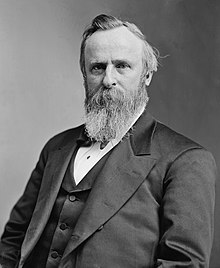Search This Blog
Sunday, April 15, 2012
Rutherford B. Hayes
Served as president from 1877-1881
Era: Gilded Age
American Identity and Culture
During 1879 Women were now permitted to argue in the Supreme Court. They had to be lawyers that were arguing for a case in the Court. One great thing that happened during this time was in 1879. In the year 1879, Thomas Edison created the incandescent light bulb. This was a major discovery because now people could use light in their homes and outside the streets as well. Another thing is the Book H.M.S Pinafore. This book was made by the author Gilbert and Sullivan who were famous writers during this time and in the present. During this time, Rutherford also took on civil services to better the United States. Instead of giving federal jobs to people, he wished to give jobs to everyone. He was one who appointed the best known advocates for reforming things.
Economic Transformations and Globalization
In 1873 the Coinage act was passed and this stopped the coinage of silver for all coins that were worth anymore than a dollar. This made the dollar equal to the value of gold. Because of this, the money supply had contracted and the Panic of 1873 became worse because if made it more expensive for people in debt to pay back they money for they have currency that was now less valuable. A new bill was also passed called the Bland-Allison Act. This bill increased the money supply of aiding debtors because it required the United States to coin all the silver that miners sell to the federal government. Hayes however, vetoed this bill because he thought it would cause inflation that would ruin businesses. He also believed inflating the currency this much was being dishonest. Even though he had vetoed the bill, Congress overrode it. Many people in this time also had United States Notes, which were a flat currency. The government accepted these notes for taxes; however they couldn’t be redeemed for gold. This angered many people so the Treasury made the Specie Payment Resumption Act which required treasury to redeem the notes for gold.
Environment
Carl Schurz became the secretary of the Interior, being appointed by Rutherford Hayes. He laid the groundwork for establishing many national forests and he also put many Timberlands under the management of professionals. Schurz saw the hiring of federal agents and also ran thieves off public lands. He pushed legislation to withdraw federal Timberlands from sale and to regulate the timber cutting. He also tried to impose fines and even jail time for those who set forest fires, whether it was accidental or on purpose. All three of these tries to pass things failed, being unsuccessful. Schurz also warned citizens of the United States of the consequences of losing resources for being unmanageable.
Politics and Citizenship
In 1877 Rutherford B. Hayes made the compromise of 1877 which as a bargain between the Democrats and the Republicans. In this bargain, the republicans were able to win the nomination but the Democrats would still have control over Congress along with the south as well. This was due to Ulysses S. Grant’s presidency in the term from before. Another thing that happened during this time was Rutherford ending the military reconstruction in the United States. He was a supporter to the Republican Reconstruction policies but as soon as he became president, the first thing that he did was ending it and return of home rule to the South. The house of representatives was controlled by Democrats so it was impossible to get funds for the army of the south, because the Democrats did not want to appropriate funds for them. Even among Republicans, military reconstruction was slowly fading away. So he ended this. During this time, Democrats passed the army appropriation bill of 1879.
Slavery and its legacies in North America
Hayes was determined to protect black voters. In While in congress, the Democrats made the army appropriation bill of 1879. This bill had the power to repeal the Force Acts which were created during the reconstruction. These Force Acts made it illegal to prevent anyone from voting solely because of their race. Rutherford Hayes strongly wanted to protect black voter’s rights so he vetoed this bill. The Congress of Democrats did not have enough power to override this veto and they repeated this process many times, making new bills that had the same effect. Hayes, each time would veto the bill until he finally passed a bill that actually allowed people to vote. Although the help for the election process for Black voters remained successful, they were unfunded for there were no funds anymore to enforce the law.
War and Diplomacy
In 1878, Rutherford Hayes had settled a dispute between Argentina and Paraguay during the Paraguayan war. He awarded Gran Chaco to Paraguay which was a region in Latin America. Another thing that he wanted was the construction of a new Canal in Panama. This was bad because it was a territory of Colombia. Throughout his presidency, there were also Mexican bandits that would crossover into the United States. Rutherford allowed the military to pursue these bandits even if they went into Mexico. Porfirio Diaz, however, disapproved of this and sent his troops over to the Mexico and American border to keep the situation their calm. By 1880, Hayes revoked the ability for the military to enter Mexico in pursuit of bandits. The foreign policy also dealt with China. In 1868, there was the Burlingame Treaty which allowed an unrestricted entry for Chinese immigrants into the country of the United States. Chinese immigrants were later blamed for low wages in America and later in 1879; the Congress passed the Chinese Exclusion Act which destroyed the Burlingame Treaty. Hayes vetoed this bill because he believed that the US shouldn’t destroy treaties without a proper negotiation.
Subscribe to:
Post Comments (Atom)

No comments:
Post a Comment